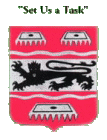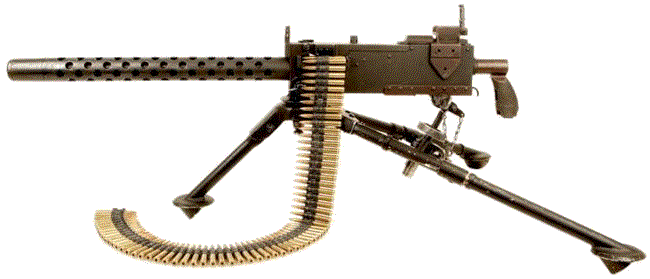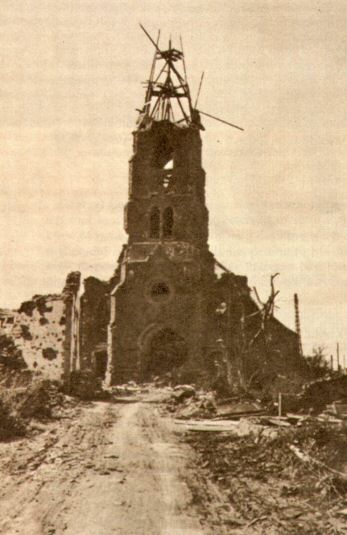146th Engineer Combat Battalion

by Carroll F. Guidry
As related to Captain Robert J. Dominique U.S. Army (Ret)
September 14, 1944, Moved from Maspelt in Belgium to Wintersheid, Germany and started on destruction of German unoccupied pill boxes so they would not be able to be used in case the Germans regained the area. I was a good thing that we did it because a couple of months later they reoccupied this area and would have had ready made positions.
We performed normal combat engineering duties from September thru October 31, clearing roads, blowing pillboxes, clearing minefields, etc. On October 31, about 3.5 miles from Vossenack, we were issued hip-boots because we were cutting trees to build a raised road for the Tank Destroyers to go to Vossenack. Lt. Rollins came in his Jeep and said to drop what we were doing and that we would go to Vossenack, as infantry because some units of the 28th Division had pulled out. They were a green troops and ran.

M1919 Browning .30 caliber air cooled medium machine gun.
I operated the air cooled .30 cal. machine gun. When they issued it to me I tried to pull back the cocking mechanism, it didn't work. Lt. Rollins went to his Jeep and took his and gave it to me. We all still had our hip boots on. I gave the machine gun to Deo, a Navaho Indian, in my squad, and we started the march to Vossenack on a trail. It was cold, mushy, yuky, terrible weather. Upon arriving on the outskirts from the west, wWe came upon a clearing from which we hit a cross road and the road to Vossenack.
When we hit the road to Vossenack the Germans started hitting us with 88's. We formed two groups along side of the road and were leap froging heading towards town. Sgt. Bill Galliot got hit in the back. A piece of shrapnel cut him open from the butt to the neck. I thought he was dead, but it looked worse than it was. He was sent to the Evac Hospital. Old Deo threw down my machine gun in the slush and rendered it useless. We continued towards Vossenack. It took us the rest of the afternoon to get to Vossenack. We couldn't figure out how the shells were coming in so close. If it wasn't for the shelter of the ditches on each side of the road we would have all been killed. Capt. Wall decided to go to the point, and while he was there he discovered an American officer, in front of the church on a field phone. He questioned the officer and suspected something and called the Artillery in the rear and asked them if they had a Forward Observer. They said no and he discovered he was a German in an American uniform. I was told that he was taken prisoner.
Then Major Baker came and joined Captain Wall. Some sniper saw them both and took a shot at them, he hit Captain Wall in the hip and Captain Wall fired back and killed the sniper. Major Baker evacuated Captain Wall to the rear. The Company was taken over by Lt. Schindler. We got as far as the church. It was already getting dark. Sgt. Webb assigned the following soldiers in the church for defensive position.
On the left side of the vestibule facing the church, was myself and Harrison Cope. On the right side was Edward Bishop and Willard Carr.

The Church of Vossenack after the action.
While we were up in the vestibule, we finally realised that the Germans were in possession of the altar part of the church. Every once in a while we would hear a pop, and a bang. We thought it was a rifle grenade, but they weren't coming to our part of the vestibule. Then all hell broke loose in the vestibule on the right side. There was a fire fight going on. It lasted for about 2-3 minutes. Then everything was silent. We heard Bishop hollering all night. It was like when you pull a cats tail, high pitch sounds punctuated with cursing. It lasted until early morning. Then he finally died and all was silent. I remember Harrison Cope saying that he would remember that sound for the rest of his life. So would I. The Germans had by then occupied the whole church.
Harrison & I decided to remain silent and stay where we were. I took a piece hard candy wrapped in cellophane. I needed something to suck on because my mouth was dry. It seemed I made a lot of noise. Just then Harrison pointed his rifle to my head and said that if I made any more noise he would blow my brains out. Needless to say I placed it neatly on the side without making any noise and sucked my tongue. It sounded like they tried to get to our position all night but there was so much debris that they couldn't reach us. Harrison had a grenade in his hand and I had my M1 in my hand covering that what was left of the stairs. We were shelled all night and as the shells would hit more debris would fall on us and the stairs. Harrison had a big piece fall on him and left it there, because he didn't want to make noise. Suddenly things went quiet, Harrison said "C. F. I think we have a bee hive in this church". There was a sound like bees buzzing. I found out later on the trip to Vossenack for D-Day, that there were six nuns saying the rosary in the cellar under the altar. Up until that time I could have swore they were bees. I understand that when "A" Company took over the church they discovered the nuns and moved them to a safe area.
As it started getting light the artillery got heavier. Both sides were planning to attack. And we were getting it from both sides. Harrison and I decided to get out while the getting was good, and the Germans were pinned down.
Unknown to us J.R. Bennet the company sharpshooter was set up in the C.P. across the street, shooting the Germans as they left the church thru the front doors. When we appeared at the door to leave, he took a bead at my head when Carl Smith knocked the gun away, and saved my life. They had thought we were dead. We ran to the C.P. on the other side of the street. I saw a box full of grenades and I stuffed them in my pockets and attached them to my belt. I was a walking time bomb.
After about 10 minutes, the sergeant in charge of a tank that was in town, (from a Sherman tank in the 707 Tank Battalion) said to us "Let's go dog feet". I don't know why he called us that. So Lt. Rollins, Sgt. Webb, and myself started the attack. As we started to go to the first house I saw a guy coming out of the house. I fired two rounds at him, the rest of the squad fired also. The German ran back to the house. Lt. Rollins told the tank commander to put two rounds into the first house. After he fired the two rounds into the house, the tank started spraying the house with machine gun fire. Lt. Rollins raised his hand for a cease fire. Lt. Rollins jumped thru a window and was closely followed by myself and Sgt. Webb. We fired several M1 rounds into the cellar and heard "Kamerad, Kamerad" we told them to come up with their hands high. After they came out of the cellar we threw grenades into it to make sure, and did the same for each successive house until we cleared the town. We had flushed several prisoners from the cellar. I saw the German that we saw outside the house on the floor by the kitchen door. I noticed that he carried two pouches that our medics carried, although he had no red crosses on him I don't know to this day if he was a medic or not. We turned the prisoners over to a squad that was collecting them. We did the same to a second and third house, and got more prisoners. As the tank was spraying the fourth house with machine gun fire, Lt Rollins fell down wounded. The guys brought him back to the third house to attend his wounds. I was left alone with the damn tank. He had already sprayed the house and he got of his hatch and told me to check out the house. I jumped thru the window head first and fired two shots into the cellar, and several prisoners came out with their hands up shouting "Kamerad, Kamerad". When they came out they look with amazement at my hip boots, which we still had on. I had to act mean and hollered at them because I was afraid that they might jump me if I was too meek. I gave the prisoners to the guy that was collecting them. While still at the fourth house the tank was spraying the fifth one. I did what Lt. Rollins did and raised my two fingers at the tank commander to indicate to put two rounds HE (High Explosives) into the house. I did the same to all of the rest of the houses we cleared. I don't know which house it was but, I got separated from the tank. As I walked around the building to get to the back my squad was lined up abreast in front of the house looking at the house and behind to their right was a machine gun position. Unknown to me the tank had passed on the other side of the house. The machine gun was pointed towards the tank and they were looking that way. I had a dead bead on them, but I remembered the German which I had thought was a medic and hesitated. I hollered at the squad for them to get the machine gun but the Germans heard me instead and they picked up the gun (which was on a bipod) and was in the process of turning it towards me. I fired a couple of rounds and the tank joined in on them also. After that the squad finally saw what was going on and started also. They immediately threw their hands up and came out. They were lucky, none of them got hit. After that was done me and my tank went to the next house we did the same thing. After we gathered the prisoners I gave them to George Katsavakis, a fellow from the squad. It was the last time I heard of him. I always thought he was killed by the prisoners. I asked Hank Kalinowsky if he knew what happened and he told me he saw a body lying in the middle of the road as we were going back to the bivouac area that had been run over by tanks and was flat. He thought it might have been George that had been killed by a mortar barrage that fell right before.
When we got to the second to last house in the town, there were more Germans there then any other. They took off running out of the back towards an open field and a P-47 Thunderbolt came out of the blue and straffed them, cutting them down like wheat.
We took up defensive positions for the night with the tank next to the house with the motor running. We received a message to go back to the church cellar and wait until we were relieved by elements of the 28th Division. After we got back to the church I was sitting there shaking and couldn't do anything else but shake. I guess it was an aftermath of what had gone on. They finally came and relieved us and we went back to our bivouac.
We assembled into the church on the new day alter in the cellar, we were to be relieved by elements of the 28th Division. I don't remember when we were relieved but it must have been about 1:00 or 2:00 in the morning. We went back to our bivouac area and got some overdue rest and sleep. And as I recall, the next day or the next night we were informed that we were going to install a mine field, between Vossenack and the wooded area where the Germans were. The whole company was involved. We went in when it was dark. Went to Vossenack and went to the other side of the village and started laying mines. I was bringing the mines from the church area of the mine field. As we were putting down the mines, I noticed a lot of 88's were coming in, and in the wood line I noticed a lot of little flashes of light as the guns would go off. It seemed like the tanks were changing positions every once in a while. This went on as we were pulling down the mine field. So they evidently knew that were out there laying the mine field. We did that for two nights. And when we had finished several of us were wounded and 2-3 got killed. As I can recall things started to simmer down quite a bit, and I was under the impression that the war would be over by Christmas, because there wasn't to much going on.
~~~ Carroll Guidry ~~~
June 28, 1924 - † June 18, 2001

Source: Former website of the 146th ECB (http://www.146thecbwwii.org/) maintained by Lenny Fox.
Please also read the personal account of Henri Kalinowsky.
